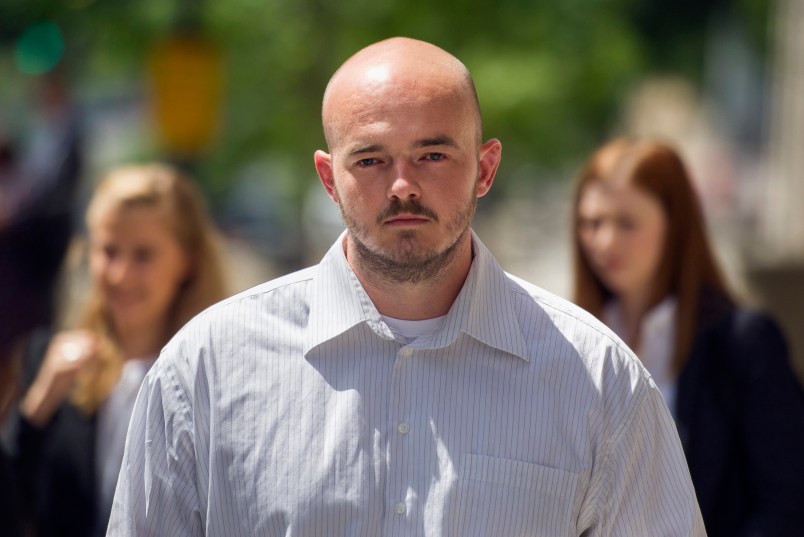WASHINGTON (AP) — The summer-long trial of four Blackwater security guards in the shootings of more than 30 Iraqis has been a grim retelling of lives snuffed out and the daily life-and-death decisions amid the chaos of war.
Wrapping up almost 6,200 miles from Baghdad, the trial is the best hope the survivors and the families of the victims have for accountability for the violence at Nisoor Square on Sept. 16, 2007, in which 14 people were killed. After 10 weeks of arguments and testimony, the case goes to the jury Tuesday.
One of the guards, Nicholas Slatten, faces up to life imprisonment if convicted of first-degree murder. The other three — Paul Slough, Dustin Heard and Evan Liberty — face mandatory minimum sentences of 30 years in prison each if convicted on a gun charge and one other felony.
In the seven years of legal proceeding it took to get the case to trial, the world has largely moved on. But for federal prosecutors seeking prison terms — and for the accused and their defense lawyers looking for the jury’s understanding — the case comes down to a question of justice.
To drive home the horror of permanently disabling gunshot wounds, prosecutors had one Iraqi witness partially disrobe to show his injuries to the jury of eight women and four men. The 12-person panel includes a few military veterans and government employees.
Under gentle questioning by the prosecution, another witness bowed his head and wept uncontrollably as he described the killing of his 9-year-old son. After the gunfire stopped, the father said, he opened a back door on his car. His son’s brains fell out at his feet, he said.
“The world went dark for me,” he testified through an interpreter.
Among the victims was a down-on-his-luck potato farmer who had gone to Baghdad looking for work. He was wounded; two cousins with him were killed.
Other victims included a devoutly religious mother and her daughter, who were in the Nisoor Square area applying for travel documents so they could visit holy sites. The mother’s last act before dying was to grab her daughter’s head and shelter it in her lap, likely saving her life.
Prosecutors summoned more than 60 witnesses, the defense just four. But that seeming imbalance doesn’t tell the whole story because some of the prosecution’s witnesses turned out to be helpful to the four employees of the private company that provided security for U.S. officials after the 2003 U.S.-led invasion of Iraq.
Lawyers for the four defendants have argued that insurgents fired on a Blackwater vehicle convoy in the square, prompting a justifiable response from the guards.
The prosecutors maintain there was no incoming gunfire at Nisoor Square that day.
In closing arguments last week, prosecutor Anthony Asuncion said Slatten, the guard charged with murder, was “the one who lit the match that ignited the firestorm.” Asuncion said Slatten fired the first shots, killing the driver of a car moving through the square toward the convoy.
Slatten didn’t fire the first shots, responded Brian Heberlig, a lawyer for Slough.
“My client Paul Slough fired the first shots,” Heberlig said.
Slough was shooting at the engine block of the approaching car and not at its driver or passenger, Heberlig said. Shooting the engine block was what Slough had been trained to do in such circumstances, the lawyer said.
Prosecutors have gotten the case “wrong from start to finish,” Heberlig said. “Nicholas Slatten didn’t shoot the driver of that car.”
Heberlig said Jeremy Ridgeway, another former Blackwater guard, fired the shots that killed the driver. Ridgeway was one of the prosecution’s main witnesses and has pleaded guilty in the case.
Prosecutors argued that Slatten looked through his sniper scope and saw a close-up image of the driver.
Slatten’s attorney, Thomas Connolly, asked the jury if they heard from any witnesses saying that they saw Slatten look through the sniper scope.
“They’re just making this stuff up,” Connolly told the jury.
Separately, a number of prosecution witnesses lent support to the defense on the issue of incoming gunfire.
Kevin Rhodes, a former Blackwater guard, testified that as soon as he heard the first gunshots that day, he saw fluid pouring from the radiator of one of the Blackwater convoy’s vehicles. He said that led him to believe that the shots were incoming gunfire that had hit the radiator.
In rebuttal, prosecutor Patrick Martin told the jury that the mark on the radiator looks like marks caused by an M203 grenade. The Blackwater guards had fired several such rounds the day before the Nisoor Square shootings.
Copyright 2014 The Associated Press. All rights reserved. This material may not be published, broadcast, rewritten or redistributed.







…mercenaries brought to you by the MIC subsidized in part by BlackWater and Halliburton.
eric prince should be right there with them …if not that for the numerous crimes he and his mercinaries have committed
So many war criminals, so little time. At least this is a good start.
With any luck, they’ll get to serve their prison sentences in an Iraqi prison. Just thinking out loud here.
Murderers for hire; no pity here- drop them in a deep hole and fill it in with cement.
Mercenaries are nothing more than terrorists with a bank account and stock options- we should bring back the 19th century fix for these vermin and hang them from any nearest tree.
What about the higher-ups who approved and even encouraged that kind of behavior?